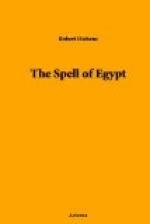Contrast is the salt, the pepper, too, of life, and one of the great joys of travel is that at will one can command contrast. From silence one can plunge into noise, from stillness one can hasten to movement, from the strangeness and the wonder of the antique past one can step into the brilliance, the gaiety, the vivid animation of the present. From Babylon one can go to Bulak; and on to Bab Zouweleh, with its crying children, its veiled women, its cake-sellers, its fruiterers, its turbaned Ethiopians, its black Nubians, and almost fair Egyptians; one can visit the bazaars, or on a market morning spend an hour at Shareh-el-Gamaleyeh, watching the disdainful camels pass, soft-footed, along the shadowy streets, and the flat-nosed African negroes, with their almost purple-black skins, their bulging eyes, in which yellow lights are caught, and their huge hands with turned-back thumbs, count their gains, or yell their disappointment over a bargain from which they have come out not victors, but vanquished. If in Cairo there are melancholy, and silence, and antiquity, in Cairo may be found also places of intense animation, of almost frantic bustle, of uproar that cries to heaven. To Bulak still come the high-prowed boats of the Nile, with striped sails bellying before a fair wind, to unload their merchandise. From the Delta they bring thousands of panniers of fruit, and from Upper Egypt and from Nubia all manner of strange and precious things which are absorbed into the great bazaars of the city, and are sold to many a traveller at prices which, to put it mildly, bring to the sellers a good return. For in Egypt if one leave his heart, he leaves also not seldom his skin. The goblin men of the great goblin market of Cairo take all, and remain unsatisfied and calling for more. I said, in a former chapter, that no fierce demands for money fell upon my ears. But I confess, when I said it, that I had forgotten certain bazaars of Cairo.
But what matters it? He who has drunk Nile waters must return. The golden country calls him; the mosques with their marble columns, their blue tiles, their stern-faced worshippers; the narrow streets with their tall houses, their latticed windows, their peeping eyes looking down on the life that flows beneath and can never be truly tasted; the Pyramids with their bases in the sand and their pointed summits somewhere near the stars; the Sphinx with its face that is like the enigma of human life; the great river that flows by the tombs and the temples; the great desert that girdles it with a golden girdle.
Egypt calls—even across the space of the world; and across the space of the world he who knows it is ready to come, obedient to its summons, because in thrall to the eternal fascination of the “land of sand, and ruins, and gold”; the land of the charmed serpent, the land of the afterglow, that may fade away from the sky above the mountains of Libya, but that fades never from the memory of one who has seen it from the base of some great column, or the top of some mighty pylon; the land that has a spell—wonderful, beautiful Egypt.




